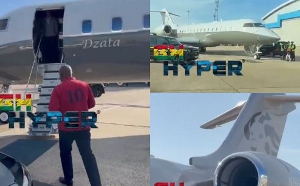The multiple-award winning journalist cum Executive Director of Human Rights Reporters Ghana(HRRG), Mr. Joseph Kobla Wemakor has observed that the newly developed Mobile Application on Migration Reporting; “MigStories App” is nothing but an ‘absolute powerful tool’ in the hands of journalists and reporters in bringing up to speed news coverage or filling of their reports on migration and free movement of persons in Africa.
“I’ve tried and tested it and I can confidently confirm that the app is so amazing, very cool for use and it puts the ‘absolute power’ in our hands as journalists to be able to file our stories from a field as well as have them published online without hitches.
“In fact, the days of having to beg editors to publish our migration-related stories for us will be a thing of the past and there will be no ‘wahala’ for us migration journalists anymore”, he concluded.
Mr. Wemakor who also doubles as the Editor-In-Chief of Ghananewsone.com, made this remark while making his views about the usefulness of the application known at a colorful ceremony to launch the mobile application which is intended to facilitate reporting of migration stories including a training manual on investigative journalism om migration and free movement.
The event which took place in Accra on May 8, 2019 at the Ministry of Information conference room also witnessed ten (10) journalists who emerged winners in the ‘2018 media competition on migration reporting’ honored for excellent reporting on issues of migration and free movement of persons.
The MigStories App was developed to assist citizens, journalists and advocates to report on migration issues from the field. The key features of the App include text writing function, camera function for photos, video and audio recording, database of migration stories and function to file reports and attach multi-media.
It also provides a platform to directly inform migrants and also get access to up-to-date migration data besides the ability to access the counter trafficking hotlines. The app will help users to understand the extent of mobility of migrants and ensure their linkage to services, helping to improve information collection on migrants.
The database of migration stories provides an accounting of migration stories by citizens and journalists. It also supports regional and global migration stories. The database can be accessed at www.ghanamigrationstories.org
The event formed the final activity of the project ‘Media Training and Public Sensitization on ECOWAS and Migrants’ Rights’ which is jointly funded by the European Union and ECOWAS Commission within the framework of the project ‘Support to Free Movement of Persons and Migration in West Africa” and implemented in Ghana by Media Response with technical support from the International Organization for Migration (IOM) in West Africa.
The development and deployment of a series of functional tools including a training manual on investigative journalism on migration and free movement, a mobile application to facilitate reporting of migration issues by journalists from the field and a database of migration stories was jointly funded by the European Union and ECOWAS Commission.
The training manual offers a compilation of knowledge materials from training workshops on investigative journalism and social media/mobile apps and designing a public media campaign on free movement and migration held in four regions of Ghana – Greater Accra, Western, Ashanti and Northern regions and serves as a valuable resource material for journalists and media practitioners. It also serves as a useful study material for students of journalism.
The Executive Director of Media Response, Mr. Samuel Dodoo in his presentation at the ceremony said: “These tools are aimed at assisting citizens, journalists and advocates to promote the rights of migrants and the free movement of persons in West Africa”.
He said the training manual offers a compilation of knowledge materials from training workshops on investigative journalism and social media/mobile apps and designing a public media campaign on free movement and migration held in four regions of Ghana – Greater Accra, Western, Ashanti and Northern regions and serves as a valuable resource material for journalists and media practitioners.
“It also serves as a useful study material for students of journalism in West Africa, he concluded”, he maintained.
Delivering a speech at the ceremony, Mr. Albert Siaw-Boateng, Director of Free Movement and Migration at the ECOWAS Commission stated that between 85 - 90 percent of West Africans travel within the ECOWAS space.
This he affirmed, was a clear indication that migration was a way of life for most West Africans. To this end, various frameworks have been established by ECOWAS in order to guide the way people move about within the ECOWAS space. These he said, included the Migration Dialogue in West Africa which is a platform for discussion of migration issues; establishment of thematic groups in terms of border management; Migration Data; ECOWAS Biometric ID Card which replaced the ECOWAS Travel Certificate; Heads of Immigration meetings which are held annually where issues of migration that cannot be handled at the national level are brought to the regional level.
In her statement, the Programme Manager for FMM West Africa, Mrs. Ida Mae Fernandez reiterated the importance of the project in promoting the free movement of persons and migrants’ rights. She commended all the stakeholders including the state authorities for their involvement and commitment to the project.
The representative of the European Union Delegation in Ghana Mr. Emmanuel Soubiran reiterated the EU’s support to the project and commitment towards supporting ECOWAS to curb irregular migration and free movement within the region.
In his keynote address, the Minister for Information, Hon. Kojo Oppong Nkrumah urged governments to create opportunities for the youth in order to reduce the challenges of irregular migration. The Minister stated that the whole exercise to build capacity of media and putting together a framework was to create a space where the media can help communicate to the general public a lot of the unintended consequences and the risks associated with irregular migration.
“Media is a good channel through which both inbound and outbound migrant countries we can do a number of things including educating, updating and sometimes scaring people of the risks and unintended consequences of irregular migration” he stated.
He further expressed government’s commitment to the project and thanked the partners, key stakeholders including the European Union, ECOWAS Commission and the IOM for their support.
Other speakers at the event were Mr. Albert Owusu, General Manager of the Ghana News Agency, Mrs. Linda Asante-Adjei, Vice President of the Ghana Journalists Association, Mr. Charles Wireko, Director for Information Services Department (ISD) and Assistant Superintendent of Immigration, Richard Brinfour.
Also present at the ceremony were Mr. Ernest Amporful, Director of the ECOWAS National Unit, Ministry of Foreign Affairs and Regional Integration, Ms. Gloria Hiadzi, Executive Secretary of the Ghana Independent Broadcasters Association (GIBA), Mr.Daniel Tagoe, Project Assistant, IOM Ghana Ms. Taibatou Sidibe, NSA Coordinator, FMM West Africa, Mr. Farah Mohammed, M&E Officer, FMM West Africa, Yohana Gaja, Database Assistant, FMM West Africa, Mr. Charles Nii Ayiku Ayiku, consultant and developer of the MigStories APP and Database of Migration Stories, Mr. Stephen Tindi, Consultant for the Training Manual as well as representatives of civil society organizations, officers from the Ghana Immigration Service a cross section of media personnel as well as students of selected journalism institutions in Ghana.
Since its inception in May 2017, the project has trained up to 90 journalists on investigative journalism and up to 80 on social media/mobile apps and designing a public media campaign on free movement and migration. It has also seen the holding of live radio talk shows on migration and free movement on eight radio stations in four regions over a period of ten weeks. In the same vein, lessons learnt workshops were held in the four project target regions to draw recommendations from beneficiaries and key stakeholders of the project.
The project significantly contributed to promoting knowledge and awareness of national and international frameworks for migration among journalists. It has further created a critical mass of advocates in the media who are willing and able to provide fair and objective coverage on issues of migration.
Media Response is a Ghana based NGO selected to implement the project on “Media Training and Public Sensitization on ECOWAS and Migrants Rights” in the framework of the project “Support to Free Movement of Persons & Migration in West Africa”. The project is jointly funded by the ECOWAS Commission and the European Union.
General News of Thursday, 16 May 2019
Source: ghananewsone.com













